Legislation, Ethics, and Consumer Protection in Travel and Tourism
VerifiedAdded on 2020/10/22
|16
|4960
|429
Report
AI Summary
This report provides a comprehensive overview of the legal and ethical considerations within the travel and tourism sector. It begins by outlining the legal and regulatory frameworks, including acts related to tourism development, transport, and package tours, while also detailing the roles of regulatory bodies such as the Health and Safety Commission and the Civil Aviation Authority. The report then delves into transport law, examining surface, sea, and air transport regulations concerning passenger carriage and associated liabilities. Furthermore, it assesses the impacts of health, safety, and security legislation, as well as equality legislation, on the industry. The report also explores contract legislation, consumer protection, and ethical situations encountered in the sector, including corporate social responsibility policies. The report underscores the importance of adhering to legal and ethical standards to ensure passenger safety, consumer rights, and overall industry sustainability.
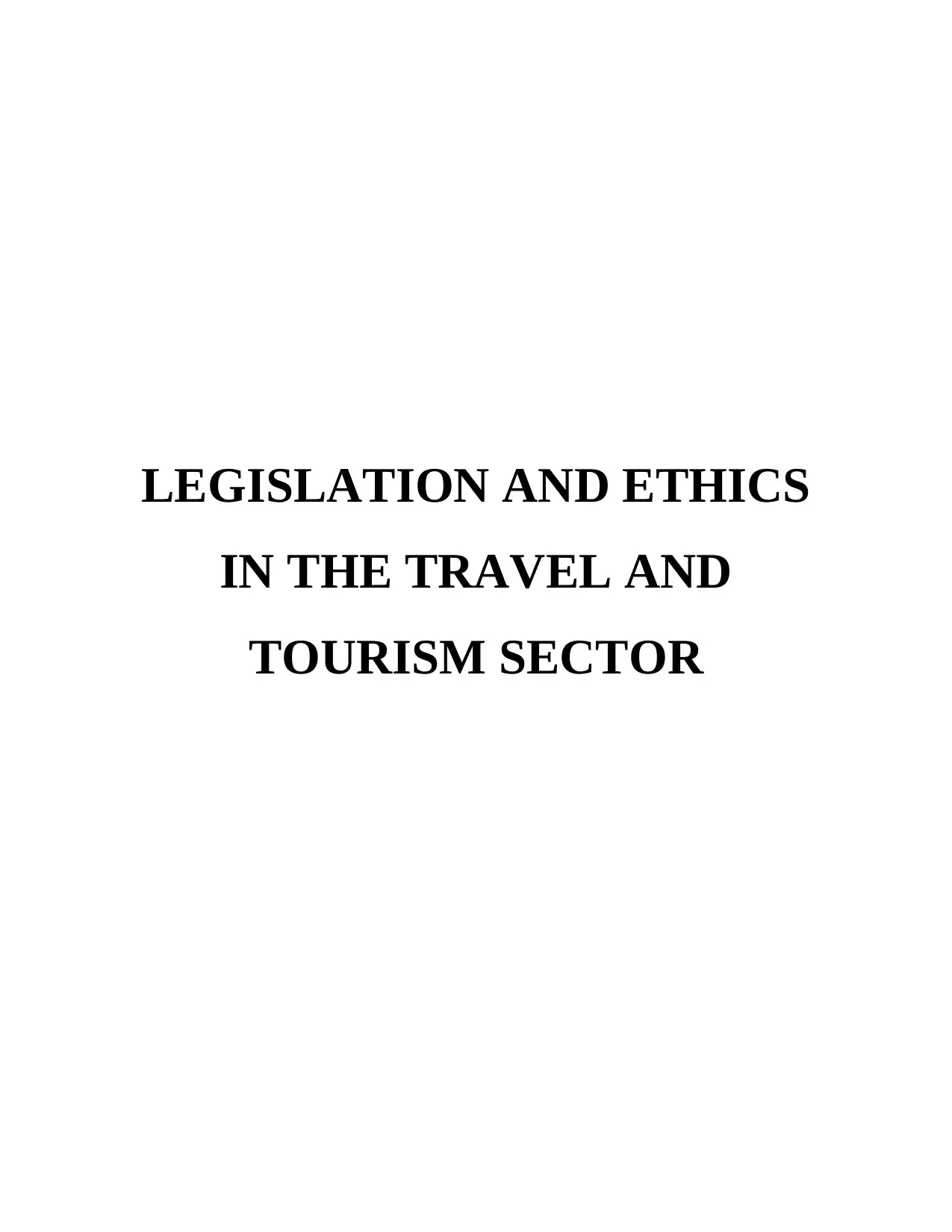
LEGISLATION AND ETHICS
IN THE TRAVEL AND
TOURISM SECTOR
IN THE TRAVEL AND
TOURISM SECTOR
Paraphrase This Document
Need a fresh take? Get an instant paraphrase of this document with our AI Paraphraser
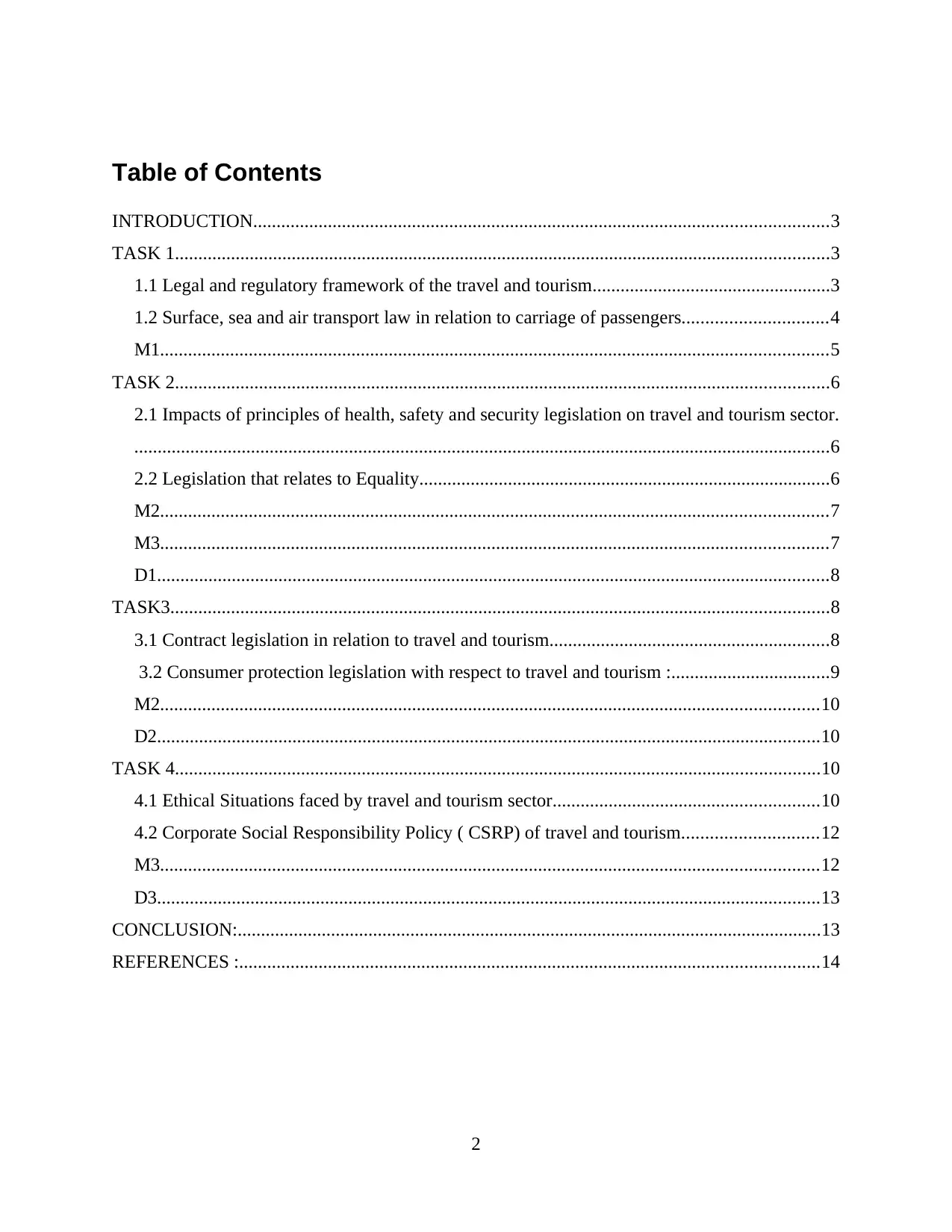
Table of Contents
INTRODUCTION...........................................................................................................................3
TASK 1............................................................................................................................................3
1.1 Legal and regulatory framework of the travel and tourism...................................................3
1.2 Surface, sea and air transport law in relation to carriage of passengers...............................4
M1...............................................................................................................................................5
TASK 2............................................................................................................................................6
2.1 Impacts of principles of health, safety and security legislation on travel and tourism sector.
.....................................................................................................................................................6
2.2 Legislation that relates to Equality........................................................................................6
M2...............................................................................................................................................7
M3...............................................................................................................................................7
D1................................................................................................................................................8
TASK3.............................................................................................................................................8
3.1 Contract legislation in relation to travel and tourism............................................................8
3.2 Consumer protection legislation with respect to travel and tourism :..................................9
M2.............................................................................................................................................10
D2..............................................................................................................................................10
TASK 4..........................................................................................................................................10
4.1 Ethical Situations faced by travel and tourism sector.........................................................10
4.2 Corporate Social Responsibility Policy ( CSRP) of travel and tourism.............................12
M3.............................................................................................................................................12
D3..............................................................................................................................................13
CONCLUSION:.............................................................................................................................13
REFERENCES :............................................................................................................................14
2
INTRODUCTION...........................................................................................................................3
TASK 1............................................................................................................................................3
1.1 Legal and regulatory framework of the travel and tourism...................................................3
1.2 Surface, sea and air transport law in relation to carriage of passengers...............................4
M1...............................................................................................................................................5
TASK 2............................................................................................................................................6
2.1 Impacts of principles of health, safety and security legislation on travel and tourism sector.
.....................................................................................................................................................6
2.2 Legislation that relates to Equality........................................................................................6
M2...............................................................................................................................................7
M3...............................................................................................................................................7
D1................................................................................................................................................8
TASK3.............................................................................................................................................8
3.1 Contract legislation in relation to travel and tourism............................................................8
3.2 Consumer protection legislation with respect to travel and tourism :..................................9
M2.............................................................................................................................................10
D2..............................................................................................................................................10
TASK 4..........................................................................................................................................10
4.1 Ethical Situations faced by travel and tourism sector.........................................................10
4.2 Corporate Social Responsibility Policy ( CSRP) of travel and tourism.............................12
M3.............................................................................................................................................12
D3..............................................................................................................................................13
CONCLUSION:.............................................................................................................................13
REFERENCES :............................................................................................................................14
2
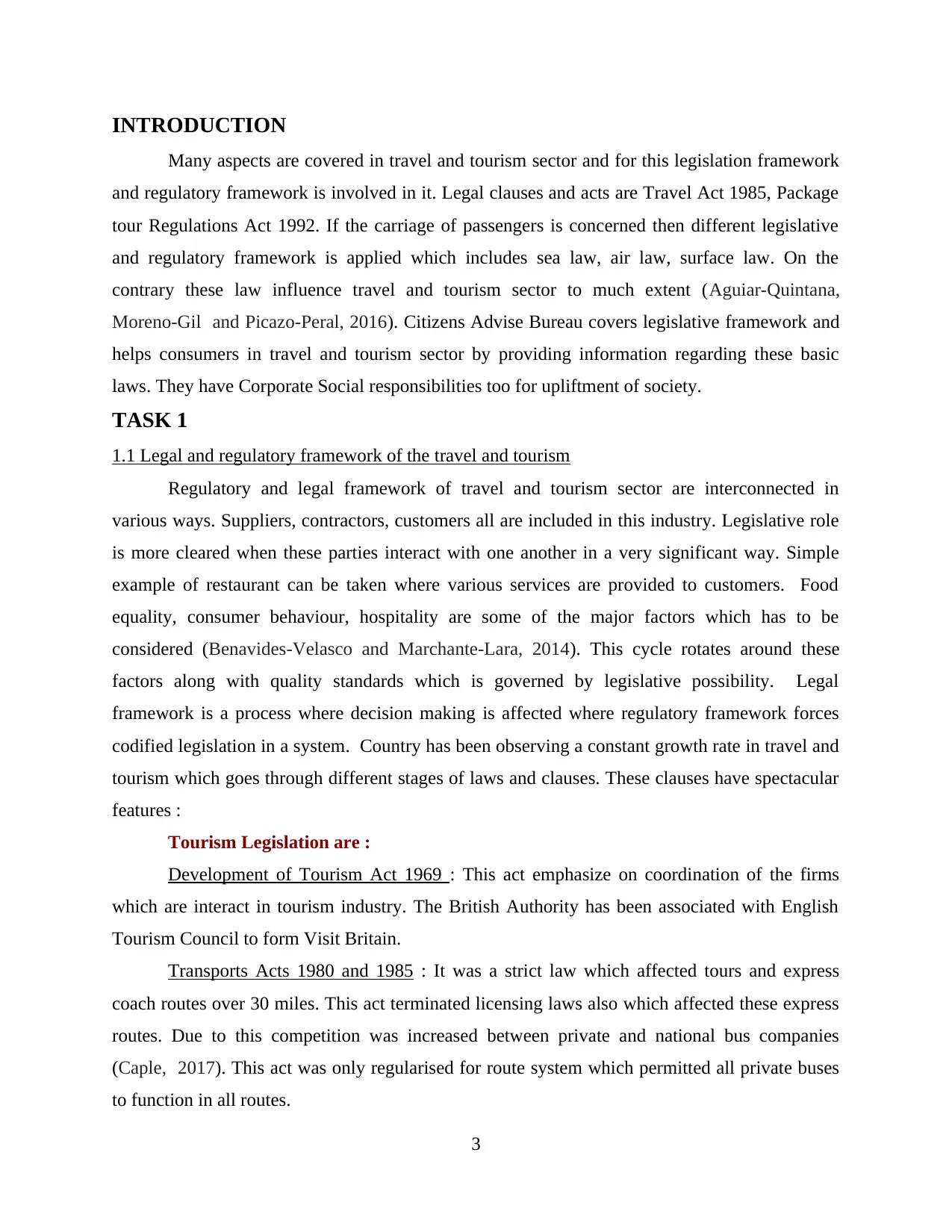
INTRODUCTION
Many aspects are covered in travel and tourism sector and for this legislation framework
and regulatory framework is involved in it. Legal clauses and acts are Travel Act 1985, Package
tour Regulations Act 1992. If the carriage of passengers is concerned then different legislative
and regulatory framework is applied which includes sea law, air law, surface law. On the
contrary these law influence travel and tourism sector to much extent (Aguiar-Quintana,
Moreno-Gil and Picazo-Peral, 2016). Citizens Advise Bureau covers legislative framework and
helps consumers in travel and tourism sector by providing information regarding these basic
laws. They have Corporate Social responsibilities too for upliftment of society.
TASK 1
1.1 Legal and regulatory framework of the travel and tourism
Regulatory and legal framework of travel and tourism sector are interconnected in
various ways. Suppliers, contractors, customers all are included in this industry. Legislative role
is more cleared when these parties interact with one another in a very significant way. Simple
example of restaurant can be taken where various services are provided to customers. Food
equality, consumer behaviour, hospitality are some of the major factors which has to be
considered (Benavides-Velasco and Marchante-Lara, 2014). This cycle rotates around these
factors along with quality standards which is governed by legislative possibility. Legal
framework is a process where decision making is affected where regulatory framework forces
codified legislation in a system. Country has been observing a constant growth rate in travel and
tourism which goes through different stages of laws and clauses. These clauses have spectacular
features :
Tourism Legislation are :
Development of Tourism Act 1969 : This act emphasize on coordination of the firms
which are interact in tourism industry. The British Authority has been associated with English
Tourism Council to form Visit Britain.
Transports Acts 1980 and 1985 : It was a strict law which affected tours and express
coach routes over 30 miles. This act terminated licensing laws also which affected these express
routes. Due to this competition was increased between private and national bus companies
(Caple, 2017). This act was only regularised for route system which permitted all private buses
to function in all routes.
3
Many aspects are covered in travel and tourism sector and for this legislation framework
and regulatory framework is involved in it. Legal clauses and acts are Travel Act 1985, Package
tour Regulations Act 1992. If the carriage of passengers is concerned then different legislative
and regulatory framework is applied which includes sea law, air law, surface law. On the
contrary these law influence travel and tourism sector to much extent (Aguiar-Quintana,
Moreno-Gil and Picazo-Peral, 2016). Citizens Advise Bureau covers legislative framework and
helps consumers in travel and tourism sector by providing information regarding these basic
laws. They have Corporate Social responsibilities too for upliftment of society.
TASK 1
1.1 Legal and regulatory framework of the travel and tourism
Regulatory and legal framework of travel and tourism sector are interconnected in
various ways. Suppliers, contractors, customers all are included in this industry. Legislative role
is more cleared when these parties interact with one another in a very significant way. Simple
example of restaurant can be taken where various services are provided to customers. Food
equality, consumer behaviour, hospitality are some of the major factors which has to be
considered (Benavides-Velasco and Marchante-Lara, 2014). This cycle rotates around these
factors along with quality standards which is governed by legislative possibility. Legal
framework is a process where decision making is affected where regulatory framework forces
codified legislation in a system. Country has been observing a constant growth rate in travel and
tourism which goes through different stages of laws and clauses. These clauses have spectacular
features :
Tourism Legislation are :
Development of Tourism Act 1969 : This act emphasize on coordination of the firms
which are interact in tourism industry. The British Authority has been associated with English
Tourism Council to form Visit Britain.
Transports Acts 1980 and 1985 : It was a strict law which affected tours and express
coach routes over 30 miles. This act terminated licensing laws also which affected these express
routes. Due to this competition was increased between private and national bus companies
(Caple, 2017). This act was only regularised for route system which permitted all private buses
to function in all routes.
3
⊘ This is a preview!⊘
Do you want full access?
Subscribe today to unlock all pages.

Trusted by 1+ million students worldwide
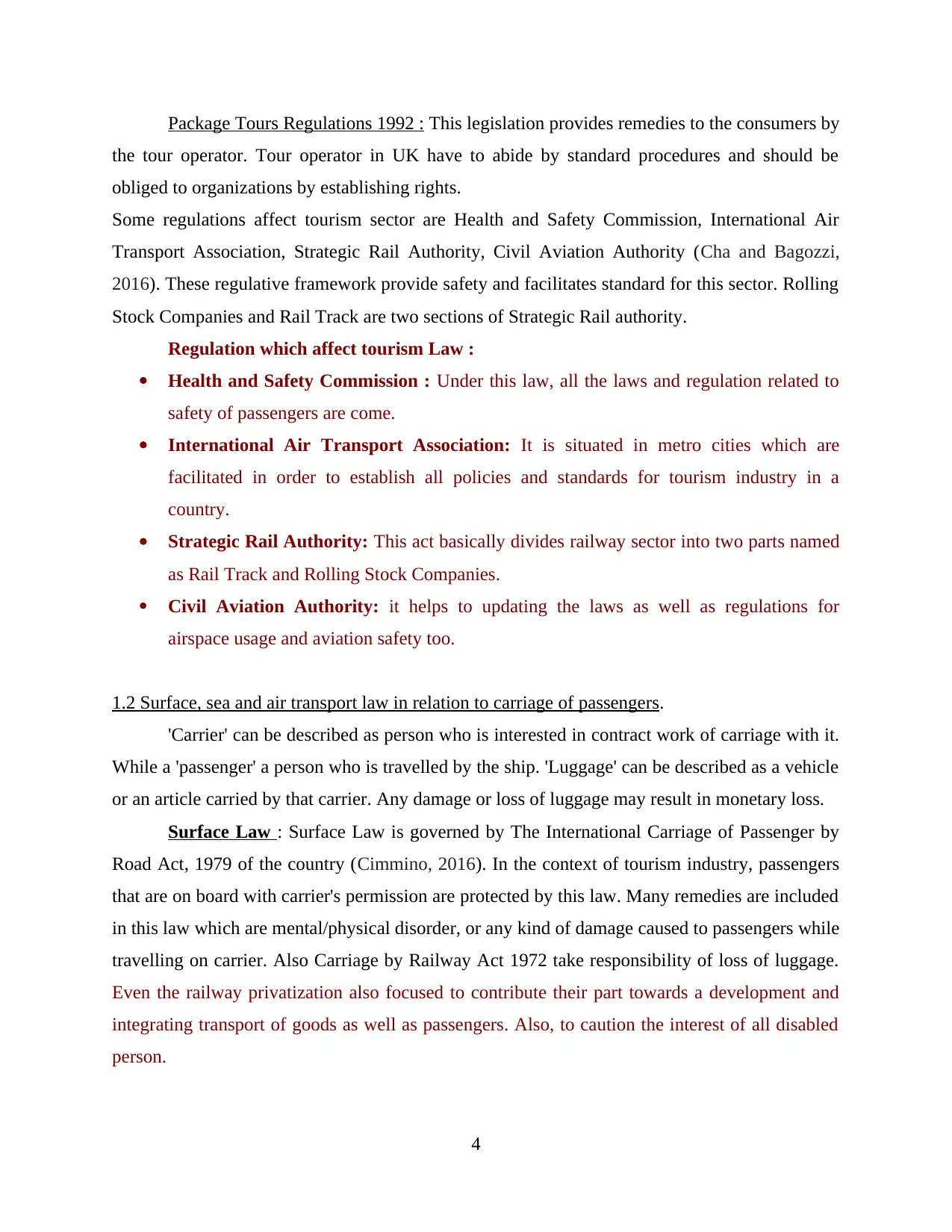
Package Tours Regulations 1992 : This legislation provides remedies to the consumers by
the tour operator. Tour operator in UK have to abide by standard procedures and should be
obliged to organizations by establishing rights.
Some regulations affect tourism sector are Health and Safety Commission, International Air
Transport Association, Strategic Rail Authority, Civil Aviation Authority (Cha and Bagozzi,
2016). These regulative framework provide safety and facilitates standard for this sector. Rolling
Stock Companies and Rail Track are two sections of Strategic Rail authority.
Regulation which affect tourism Law :
Health and Safety Commission : Under this law, all the laws and regulation related to
safety of passengers are come.
International Air Transport Association: It is situated in metro cities which are
facilitated in order to establish all policies and standards for tourism industry in a
country.
Strategic Rail Authority: This act basically divides railway sector into two parts named
as Rail Track and Rolling Stock Companies.
Civil Aviation Authority: it helps to updating the laws as well as regulations for
airspace usage and aviation safety too.
1.2 Surface, sea and air transport law in relation to carriage of passengers.
'Carrier' can be described as person who is interested in contract work of carriage with it.
While a 'passenger' a person who is travelled by the ship. 'Luggage' can be described as a vehicle
or an article carried by that carrier. Any damage or loss of luggage may result in monetary loss.
Surface Law : Surface Law is governed by The International Carriage of Passenger by
Road Act, 1979 of the country (Cimmino, 2016). In the context of tourism industry, passengers
that are on board with carrier's permission are protected by this law. Many remedies are included
in this law which are mental/physical disorder, or any kind of damage caused to passengers while
travelling on carrier. Also Carriage by Railway Act 1972 take responsibility of loss of luggage.
Even the railway privatization also focused to contribute their part towards a development and
integrating transport of goods as well as passengers. Also, to caution the interest of all disabled
person.
4
the tour operator. Tour operator in UK have to abide by standard procedures and should be
obliged to organizations by establishing rights.
Some regulations affect tourism sector are Health and Safety Commission, International Air
Transport Association, Strategic Rail Authority, Civil Aviation Authority (Cha and Bagozzi,
2016). These regulative framework provide safety and facilitates standard for this sector. Rolling
Stock Companies and Rail Track are two sections of Strategic Rail authority.
Regulation which affect tourism Law :
Health and Safety Commission : Under this law, all the laws and regulation related to
safety of passengers are come.
International Air Transport Association: It is situated in metro cities which are
facilitated in order to establish all policies and standards for tourism industry in a
country.
Strategic Rail Authority: This act basically divides railway sector into two parts named
as Rail Track and Rolling Stock Companies.
Civil Aviation Authority: it helps to updating the laws as well as regulations for
airspace usage and aviation safety too.
1.2 Surface, sea and air transport law in relation to carriage of passengers.
'Carrier' can be described as person who is interested in contract work of carriage with it.
While a 'passenger' a person who is travelled by the ship. 'Luggage' can be described as a vehicle
or an article carried by that carrier. Any damage or loss of luggage may result in monetary loss.
Surface Law : Surface Law is governed by The International Carriage of Passenger by
Road Act, 1979 of the country (Cimmino, 2016). In the context of tourism industry, passengers
that are on board with carrier's permission are protected by this law. Many remedies are included
in this law which are mental/physical disorder, or any kind of damage caused to passengers while
travelling on carrier. Also Carriage by Railway Act 1972 take responsibility of loss of luggage.
Even the railway privatization also focused to contribute their part towards a development and
integrating transport of goods as well as passengers. Also, to caution the interest of all disabled
person.
4
Paraphrase This Document
Need a fresh take? Get an instant paraphrase of this document with our AI Paraphraser
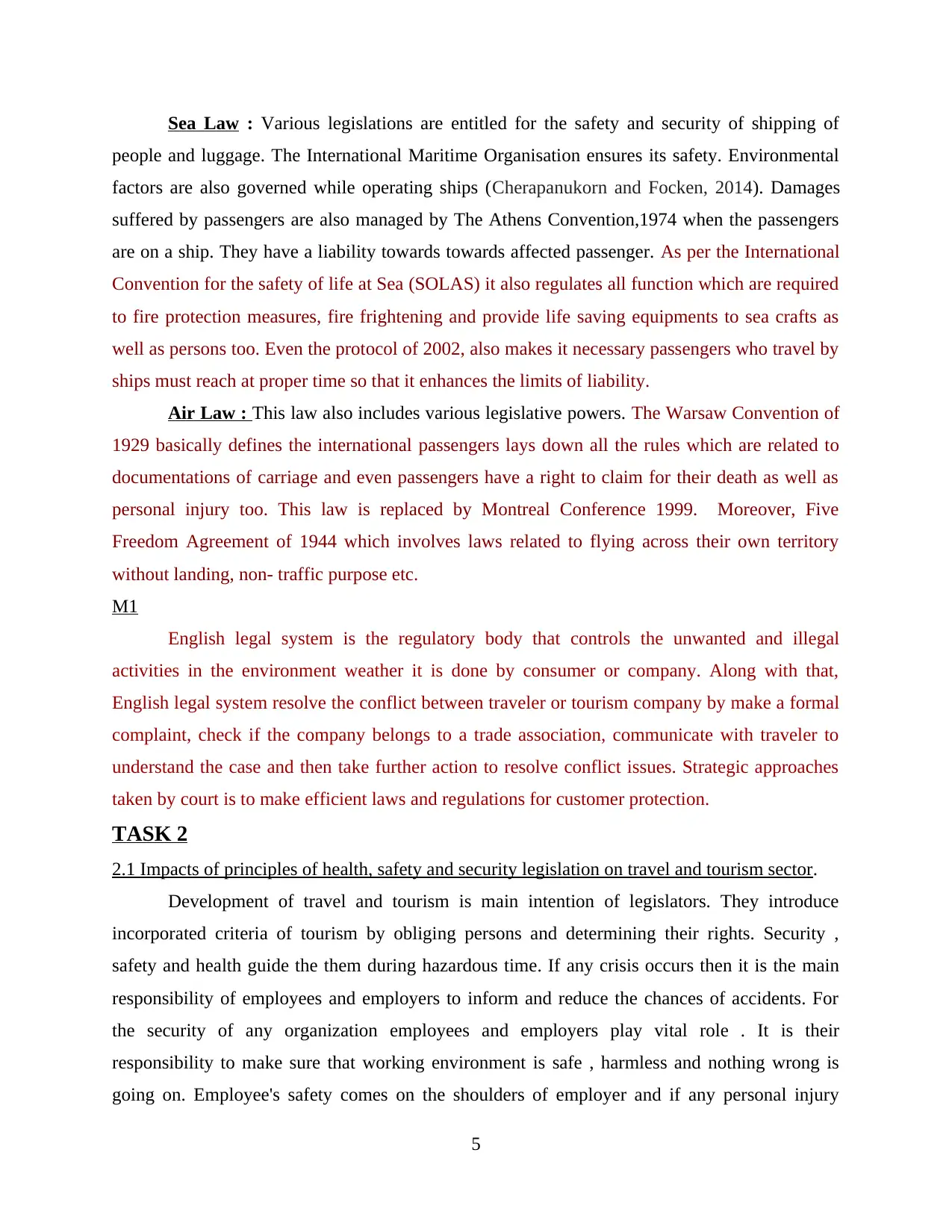
Sea Law : Various legislations are entitled for the safety and security of shipping of
people and luggage. The International Maritime Organisation ensures its safety. Environmental
factors are also governed while operating ships (Cherapanukorn and Focken, 2014). Damages
suffered by passengers are also managed by The Athens Convention,1974 when the passengers
are on a ship. They have a liability towards towards affected passenger. As per the International
Convention for the safety of life at Sea (SOLAS) it also regulates all function which are required
to fire protection measures, fire frightening and provide life saving equipments to sea crafts as
well as persons too. Even the protocol of 2002, also makes it necessary passengers who travel by
ships must reach at proper time so that it enhances the limits of liability.
Air Law : This law also includes various legislative powers. The Warsaw Convention of
1929 basically defines the international passengers lays down all the rules which are related to
documentations of carriage and even passengers have a right to claim for their death as well as
personal injury too. This law is replaced by Montreal Conference 1999. Moreover, Five
Freedom Agreement of 1944 which involves laws related to flying across their own territory
without landing, non- traffic purpose etc.
M1
English legal system is the regulatory body that controls the unwanted and illegal
activities in the environment weather it is done by consumer or company. Along with that,
English legal system resolve the conflict between traveler or tourism company by make a formal
complaint, check if the company belongs to a trade association, communicate with traveler to
understand the case and then take further action to resolve conflict issues. Strategic approaches
taken by court is to make efficient laws and regulations for customer protection.
TASK 2
2.1 Impacts of principles of health, safety and security legislation on travel and tourism sector.
Development of travel and tourism is main intention of legislators. They introduce
incorporated criteria of tourism by obliging persons and determining their rights. Security ,
safety and health guide the them during hazardous time. If any crisis occurs then it is the main
responsibility of employees and employers to inform and reduce the chances of accidents. For
the security of any organization employees and employers play vital role . It is their
responsibility to make sure that working environment is safe , harmless and nothing wrong is
going on. Employee's safety comes on the shoulders of employer and if any personal injury
5
people and luggage. The International Maritime Organisation ensures its safety. Environmental
factors are also governed while operating ships (Cherapanukorn and Focken, 2014). Damages
suffered by passengers are also managed by The Athens Convention,1974 when the passengers
are on a ship. They have a liability towards towards affected passenger. As per the International
Convention for the safety of life at Sea (SOLAS) it also regulates all function which are required
to fire protection measures, fire frightening and provide life saving equipments to sea crafts as
well as persons too. Even the protocol of 2002, also makes it necessary passengers who travel by
ships must reach at proper time so that it enhances the limits of liability.
Air Law : This law also includes various legislative powers. The Warsaw Convention of
1929 basically defines the international passengers lays down all the rules which are related to
documentations of carriage and even passengers have a right to claim for their death as well as
personal injury too. This law is replaced by Montreal Conference 1999. Moreover, Five
Freedom Agreement of 1944 which involves laws related to flying across their own territory
without landing, non- traffic purpose etc.
M1
English legal system is the regulatory body that controls the unwanted and illegal
activities in the environment weather it is done by consumer or company. Along with that,
English legal system resolve the conflict between traveler or tourism company by make a formal
complaint, check if the company belongs to a trade association, communicate with traveler to
understand the case and then take further action to resolve conflict issues. Strategic approaches
taken by court is to make efficient laws and regulations for customer protection.
TASK 2
2.1 Impacts of principles of health, safety and security legislation on travel and tourism sector.
Development of travel and tourism is main intention of legislators. They introduce
incorporated criteria of tourism by obliging persons and determining their rights. Security ,
safety and health guide the them during hazardous time. If any crisis occurs then it is the main
responsibility of employees and employers to inform and reduce the chances of accidents. For
the security of any organization employees and employers play vital role . It is their
responsibility to make sure that working environment is safe , harmless and nothing wrong is
going on. Employee's safety comes on the shoulders of employer and if any personal injury
5
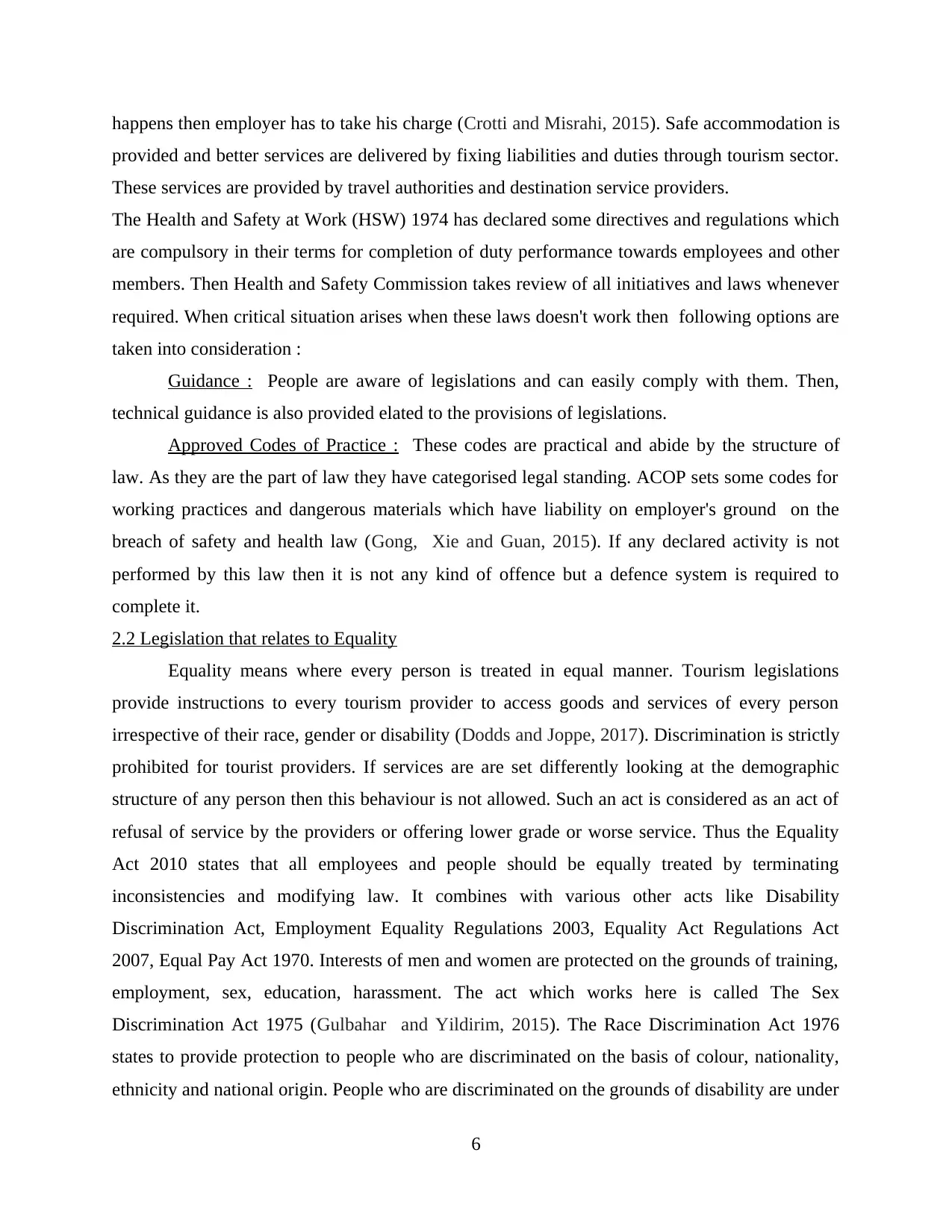
happens then employer has to take his charge (Crotti and Misrahi, 2015). Safe accommodation is
provided and better services are delivered by fixing liabilities and duties through tourism sector.
These services are provided by travel authorities and destination service providers.
The Health and Safety at Work (HSW) 1974 has declared some directives and regulations which
are compulsory in their terms for completion of duty performance towards employees and other
members. Then Health and Safety Commission takes review of all initiatives and laws whenever
required. When critical situation arises when these laws doesn't work then following options are
taken into consideration :
Guidance : People are aware of legislations and can easily comply with them. Then,
technical guidance is also provided elated to the provisions of legislations.
Approved Codes of Practice : These codes are practical and abide by the structure of
law. As they are the part of law they have categorised legal standing. ACOP sets some codes for
working practices and dangerous materials which have liability on employer's ground on the
breach of safety and health law (Gong, Xie and Guan, 2015). If any declared activity is not
performed by this law then it is not any kind of offence but a defence system is required to
complete it.
2.2 Legislation that relates to Equality
Equality means where every person is treated in equal manner. Tourism legislations
provide instructions to every tourism provider to access goods and services of every person
irrespective of their race, gender or disability (Dodds and Joppe, 2017). Discrimination is strictly
prohibited for tourist providers. If services are are set differently looking at the demographic
structure of any person then this behaviour is not allowed. Such an act is considered as an act of
refusal of service by the providers or offering lower grade or worse service. Thus the Equality
Act 2010 states that all employees and people should be equally treated by terminating
inconsistencies and modifying law. It combines with various other acts like Disability
Discrimination Act, Employment Equality Regulations 2003, Equality Act Regulations Act
2007, Equal Pay Act 1970. Interests of men and women are protected on the grounds of training,
employment, sex, education, harassment. The act which works here is called The Sex
Discrimination Act 1975 (Gulbahar and Yildirim, 2015). The Race Discrimination Act 1976
states to provide protection to people who are discriminated on the basis of colour, nationality,
ethnicity and national origin. People who are discriminated on the grounds of disability are under
6
provided and better services are delivered by fixing liabilities and duties through tourism sector.
These services are provided by travel authorities and destination service providers.
The Health and Safety at Work (HSW) 1974 has declared some directives and regulations which
are compulsory in their terms for completion of duty performance towards employees and other
members. Then Health and Safety Commission takes review of all initiatives and laws whenever
required. When critical situation arises when these laws doesn't work then following options are
taken into consideration :
Guidance : People are aware of legislations and can easily comply with them. Then,
technical guidance is also provided elated to the provisions of legislations.
Approved Codes of Practice : These codes are practical and abide by the structure of
law. As they are the part of law they have categorised legal standing. ACOP sets some codes for
working practices and dangerous materials which have liability on employer's ground on the
breach of safety and health law (Gong, Xie and Guan, 2015). If any declared activity is not
performed by this law then it is not any kind of offence but a defence system is required to
complete it.
2.2 Legislation that relates to Equality
Equality means where every person is treated in equal manner. Tourism legislations
provide instructions to every tourism provider to access goods and services of every person
irrespective of their race, gender or disability (Dodds and Joppe, 2017). Discrimination is strictly
prohibited for tourist providers. If services are are set differently looking at the demographic
structure of any person then this behaviour is not allowed. Such an act is considered as an act of
refusal of service by the providers or offering lower grade or worse service. Thus the Equality
Act 2010 states that all employees and people should be equally treated by terminating
inconsistencies and modifying law. It combines with various other acts like Disability
Discrimination Act, Employment Equality Regulations 2003, Equality Act Regulations Act
2007, Equal Pay Act 1970. Interests of men and women are protected on the grounds of training,
employment, sex, education, harassment. The act which works here is called The Sex
Discrimination Act 1975 (Gulbahar and Yildirim, 2015). The Race Discrimination Act 1976
states to provide protection to people who are discriminated on the basis of colour, nationality,
ethnicity and national origin. People who are discriminated on the grounds of disability are under
6
⊘ This is a preview!⊘
Do you want full access?
Subscribe today to unlock all pages.

Trusted by 1+ million students worldwide
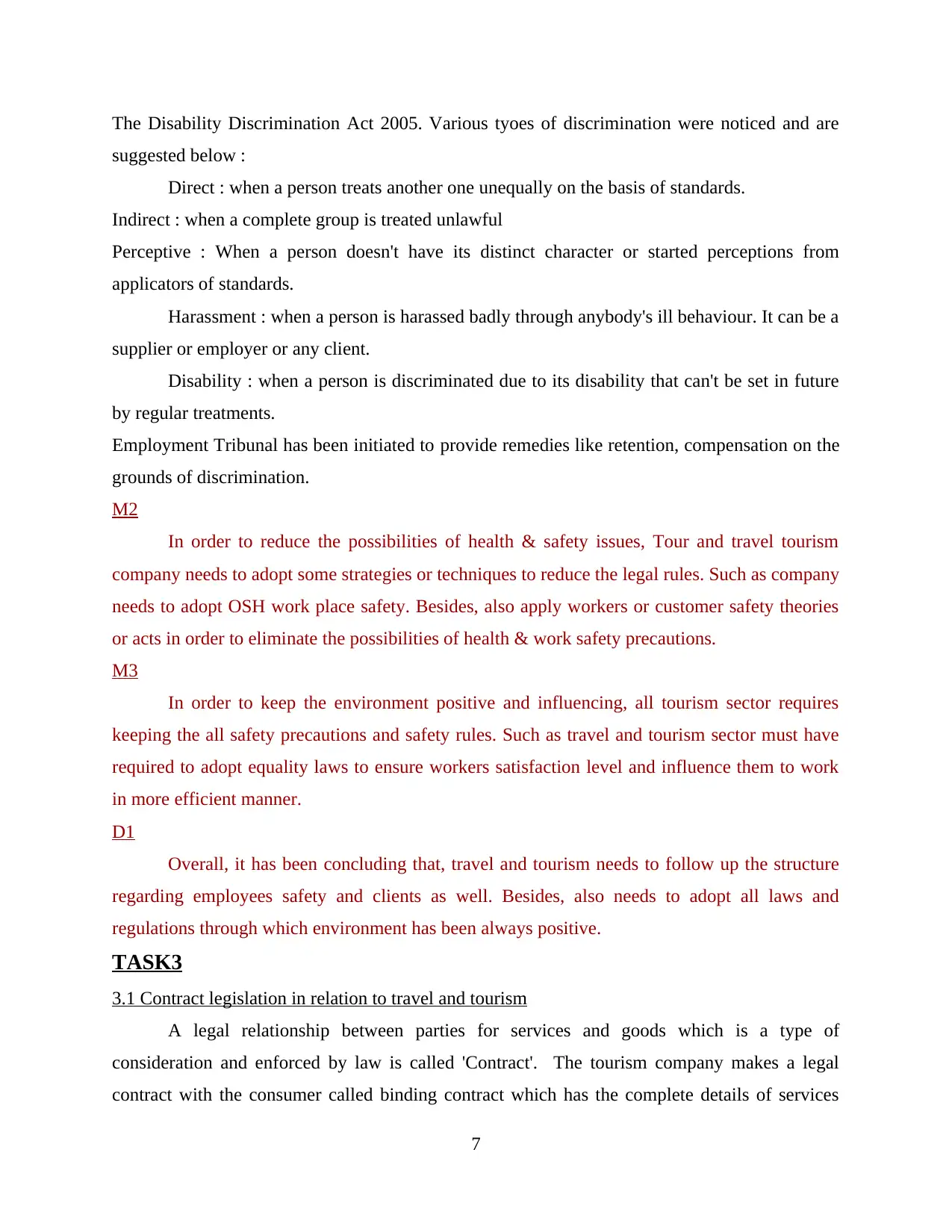
The Disability Discrimination Act 2005. Various tyoes of discrimination were noticed and are
suggested below :
Direct : when a person treats another one unequally on the basis of standards.
Indirect : when a complete group is treated unlawful
Perceptive : When a person doesn't have its distinct character or started perceptions from
applicators of standards.
Harassment : when a person is harassed badly through anybody's ill behaviour. It can be a
supplier or employer or any client.
Disability : when a person is discriminated due to its disability that can't be set in future
by regular treatments.
Employment Tribunal has been initiated to provide remedies like retention, compensation on the
grounds of discrimination.
M2
In order to reduce the possibilities of health & safety issues, Tour and travel tourism
company needs to adopt some strategies or techniques to reduce the legal rules. Such as company
needs to adopt OSH work place safety. Besides, also apply workers or customer safety theories
or acts in order to eliminate the possibilities of health & work safety precautions.
M3
In order to keep the environment positive and influencing, all tourism sector requires
keeping the all safety precautions and safety rules. Such as travel and tourism sector must have
required to adopt equality laws to ensure workers satisfaction level and influence them to work
in more efficient manner.
D1
Overall, it has been concluding that, travel and tourism needs to follow up the structure
regarding employees safety and clients as well. Besides, also needs to adopt all laws and
regulations through which environment has been always positive.
TASK3
3.1 Contract legislation in relation to travel and tourism
A legal relationship between parties for services and goods which is a type of
consideration and enforced by law is called 'Contract'. The tourism company makes a legal
contract with the consumer called binding contract which has the complete details of services
7
suggested below :
Direct : when a person treats another one unequally on the basis of standards.
Indirect : when a complete group is treated unlawful
Perceptive : When a person doesn't have its distinct character or started perceptions from
applicators of standards.
Harassment : when a person is harassed badly through anybody's ill behaviour. It can be a
supplier or employer or any client.
Disability : when a person is discriminated due to its disability that can't be set in future
by regular treatments.
Employment Tribunal has been initiated to provide remedies like retention, compensation on the
grounds of discrimination.
M2
In order to reduce the possibilities of health & safety issues, Tour and travel tourism
company needs to adopt some strategies or techniques to reduce the legal rules. Such as company
needs to adopt OSH work place safety. Besides, also apply workers or customer safety theories
or acts in order to eliminate the possibilities of health & work safety precautions.
M3
In order to keep the environment positive and influencing, all tourism sector requires
keeping the all safety precautions and safety rules. Such as travel and tourism sector must have
required to adopt equality laws to ensure workers satisfaction level and influence them to work
in more efficient manner.
D1
Overall, it has been concluding that, travel and tourism needs to follow up the structure
regarding employees safety and clients as well. Besides, also needs to adopt all laws and
regulations through which environment has been always positive.
TASK3
3.1 Contract legislation in relation to travel and tourism
A legal relationship between parties for services and goods which is a type of
consideration and enforced by law is called 'Contract'. The tourism company makes a legal
contract with the consumer called binding contract which has the complete details of services
7
Paraphrase This Document
Need a fresh take? Get an instant paraphrase of this document with our AI Paraphraser
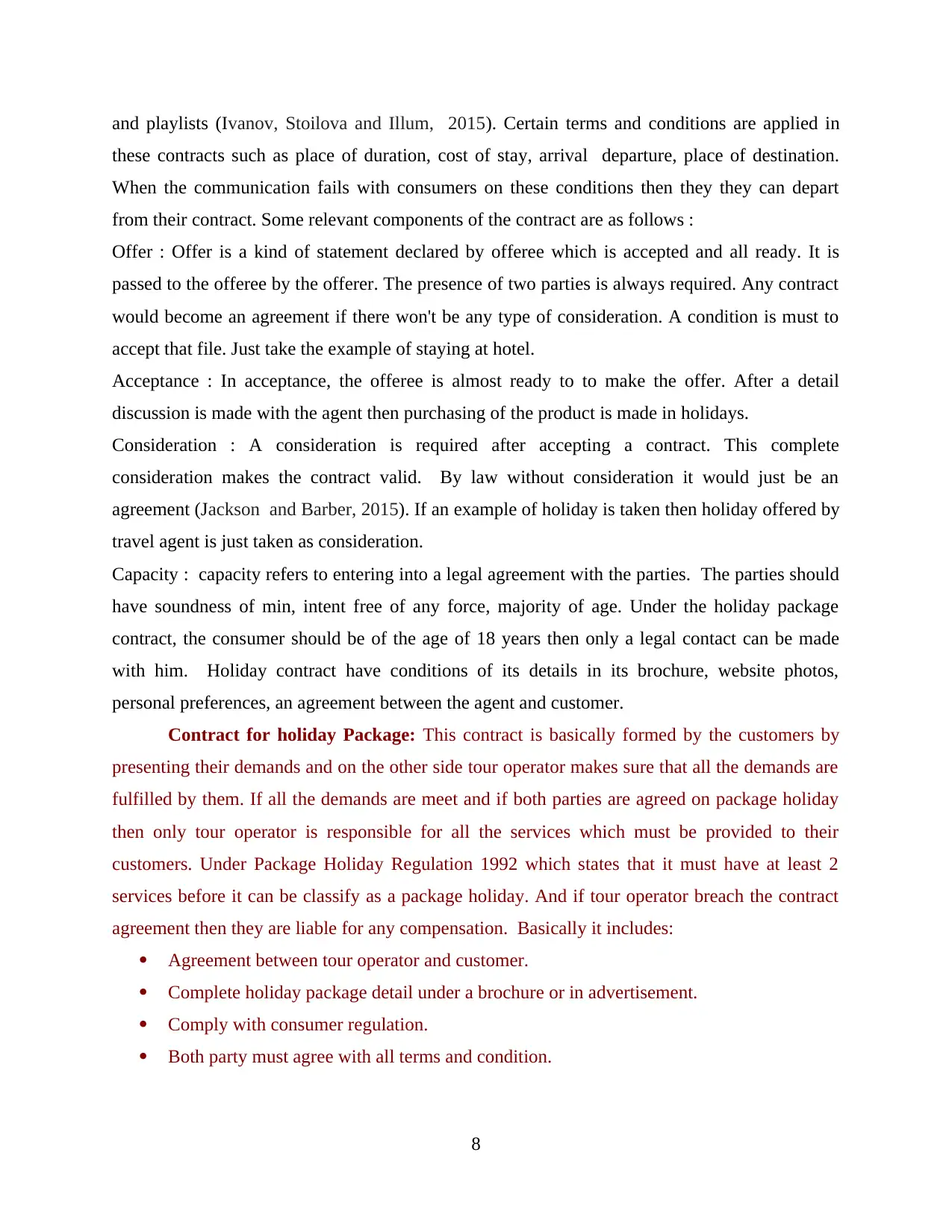
and playlists (Ivanov, Stoilova and Illum, 2015). Certain terms and conditions are applied in
these contracts such as place of duration, cost of stay, arrival departure, place of destination.
When the communication fails with consumers on these conditions then they they can depart
from their contract. Some relevant components of the contract are as follows :
Offer : Offer is a kind of statement declared by offeree which is accepted and all ready. It is
passed to the offeree by the offerer. The presence of two parties is always required. Any contract
would become an agreement if there won't be any type of consideration. A condition is must to
accept that file. Just take the example of staying at hotel.
Acceptance : In acceptance, the offeree is almost ready to to make the offer. After a detail
discussion is made with the agent then purchasing of the product is made in holidays.
Consideration : A consideration is required after accepting a contract. This complete
consideration makes the contract valid. By law without consideration it would just be an
agreement (Jackson and Barber, 2015). If an example of holiday is taken then holiday offered by
travel agent is just taken as consideration.
Capacity : capacity refers to entering into a legal agreement with the parties. The parties should
have soundness of min, intent free of any force, majority of age. Under the holiday package
contract, the consumer should be of the age of 18 years then only a legal contact can be made
with him. Holiday contract have conditions of its details in its brochure, website photos,
personal preferences, an agreement between the agent and customer.
Contract for holiday Package: This contract is basically formed by the customers by
presenting their demands and on the other side tour operator makes sure that all the demands are
fulfilled by them. If all the demands are meet and if both parties are agreed on package holiday
then only tour operator is responsible for all the services which must be provided to their
customers. Under Package Holiday Regulation 1992 which states that it must have at least 2
services before it can be classify as a package holiday. And if tour operator breach the contract
agreement then they are liable for any compensation. Basically it includes:
Agreement between tour operator and customer.
Complete holiday package detail under a brochure or in advertisement.
Comply with consumer regulation.
Both party must agree with all terms and condition.
8
these contracts such as place of duration, cost of stay, arrival departure, place of destination.
When the communication fails with consumers on these conditions then they they can depart
from their contract. Some relevant components of the contract are as follows :
Offer : Offer is a kind of statement declared by offeree which is accepted and all ready. It is
passed to the offeree by the offerer. The presence of two parties is always required. Any contract
would become an agreement if there won't be any type of consideration. A condition is must to
accept that file. Just take the example of staying at hotel.
Acceptance : In acceptance, the offeree is almost ready to to make the offer. After a detail
discussion is made with the agent then purchasing of the product is made in holidays.
Consideration : A consideration is required after accepting a contract. This complete
consideration makes the contract valid. By law without consideration it would just be an
agreement (Jackson and Barber, 2015). If an example of holiday is taken then holiday offered by
travel agent is just taken as consideration.
Capacity : capacity refers to entering into a legal agreement with the parties. The parties should
have soundness of min, intent free of any force, majority of age. Under the holiday package
contract, the consumer should be of the age of 18 years then only a legal contact can be made
with him. Holiday contract have conditions of its details in its brochure, website photos,
personal preferences, an agreement between the agent and customer.
Contract for holiday Package: This contract is basically formed by the customers by
presenting their demands and on the other side tour operator makes sure that all the demands are
fulfilled by them. If all the demands are meet and if both parties are agreed on package holiday
then only tour operator is responsible for all the services which must be provided to their
customers. Under Package Holiday Regulation 1992 which states that it must have at least 2
services before it can be classify as a package holiday. And if tour operator breach the contract
agreement then they are liable for any compensation. Basically it includes:
Agreement between tour operator and customer.
Complete holiday package detail under a brochure or in advertisement.
Comply with consumer regulation.
Both party must agree with all terms and condition.
8
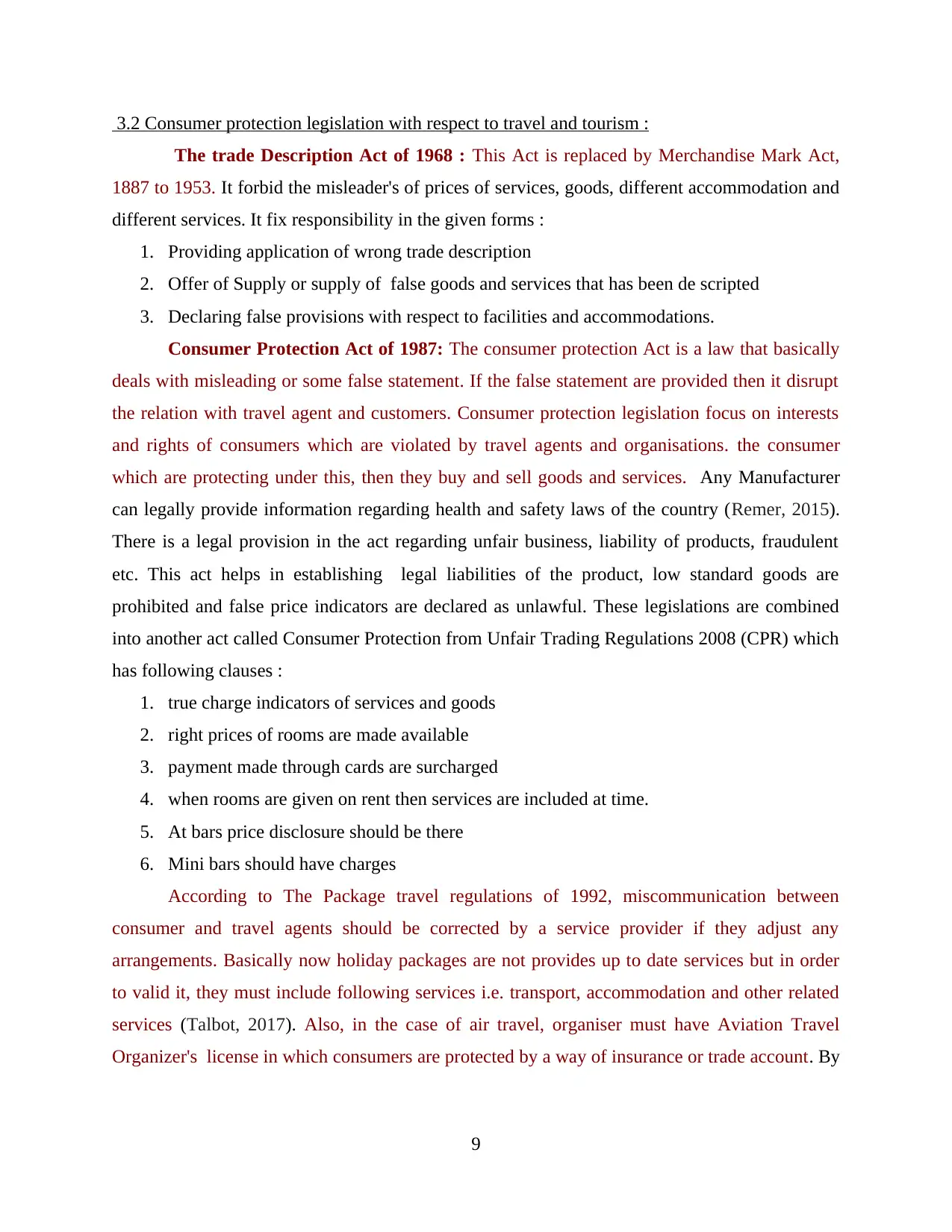
3.2 Consumer protection legislation with respect to travel and tourism :
The trade Description Act of 1968 : This Act is replaced by Merchandise Mark Act,
1887 to 1953. It forbid the misleader's of prices of services, goods, different accommodation and
different services. It fix responsibility in the given forms :
1. Providing application of wrong trade description
2. Offer of Supply or supply of false goods and services that has been de scripted
3. Declaring false provisions with respect to facilities and accommodations.
Consumer Protection Act of 1987: The consumer protection Act is a law that basically
deals with misleading or some false statement. If the false statement are provided then it disrupt
the relation with travel agent and customers. Consumer protection legislation focus on interests
and rights of consumers which are violated by travel agents and organisations. the consumer
which are protecting under this, then they buy and sell goods and services. Any Manufacturer
can legally provide information regarding health and safety laws of the country (Remer, 2015).
There is a legal provision in the act regarding unfair business, liability of products, fraudulent
etc. This act helps in establishing legal liabilities of the product, low standard goods are
prohibited and false price indicators are declared as unlawful. These legislations are combined
into another act called Consumer Protection from Unfair Trading Regulations 2008 (CPR) which
has following clauses :
1. true charge indicators of services and goods
2. right prices of rooms are made available
3. payment made through cards are surcharged
4. when rooms are given on rent then services are included at time.
5. At bars price disclosure should be there
6. Mini bars should have charges
According to The Package travel regulations of 1992, miscommunication between
consumer and travel agents should be corrected by a service provider if they adjust any
arrangements. Basically now holiday packages are not provides up to date services but in order
to valid it, they must include following services i.e. transport, accommodation and other related
services (Talbot, 2017). Also, in the case of air travel, organiser must have Aviation Travel
Organizer's license in which consumers are protected by a way of insurance or trade account. By
9
The trade Description Act of 1968 : This Act is replaced by Merchandise Mark Act,
1887 to 1953. It forbid the misleader's of prices of services, goods, different accommodation and
different services. It fix responsibility in the given forms :
1. Providing application of wrong trade description
2. Offer of Supply or supply of false goods and services that has been de scripted
3. Declaring false provisions with respect to facilities and accommodations.
Consumer Protection Act of 1987: The consumer protection Act is a law that basically
deals with misleading or some false statement. If the false statement are provided then it disrupt
the relation with travel agent and customers. Consumer protection legislation focus on interests
and rights of consumers which are violated by travel agents and organisations. the consumer
which are protecting under this, then they buy and sell goods and services. Any Manufacturer
can legally provide information regarding health and safety laws of the country (Remer, 2015).
There is a legal provision in the act regarding unfair business, liability of products, fraudulent
etc. This act helps in establishing legal liabilities of the product, low standard goods are
prohibited and false price indicators are declared as unlawful. These legislations are combined
into another act called Consumer Protection from Unfair Trading Regulations 2008 (CPR) which
has following clauses :
1. true charge indicators of services and goods
2. right prices of rooms are made available
3. payment made through cards are surcharged
4. when rooms are given on rent then services are included at time.
5. At bars price disclosure should be there
6. Mini bars should have charges
According to The Package travel regulations of 1992, miscommunication between
consumer and travel agents should be corrected by a service provider if they adjust any
arrangements. Basically now holiday packages are not provides up to date services but in order
to valid it, they must include following services i.e. transport, accommodation and other related
services (Talbot, 2017). Also, in the case of air travel, organiser must have Aviation Travel
Organizer's license in which consumers are protected by a way of insurance or trade account. By
9
⊘ This is a preview!⊘
Do you want full access?
Subscribe today to unlock all pages.

Trusted by 1+ million students worldwide
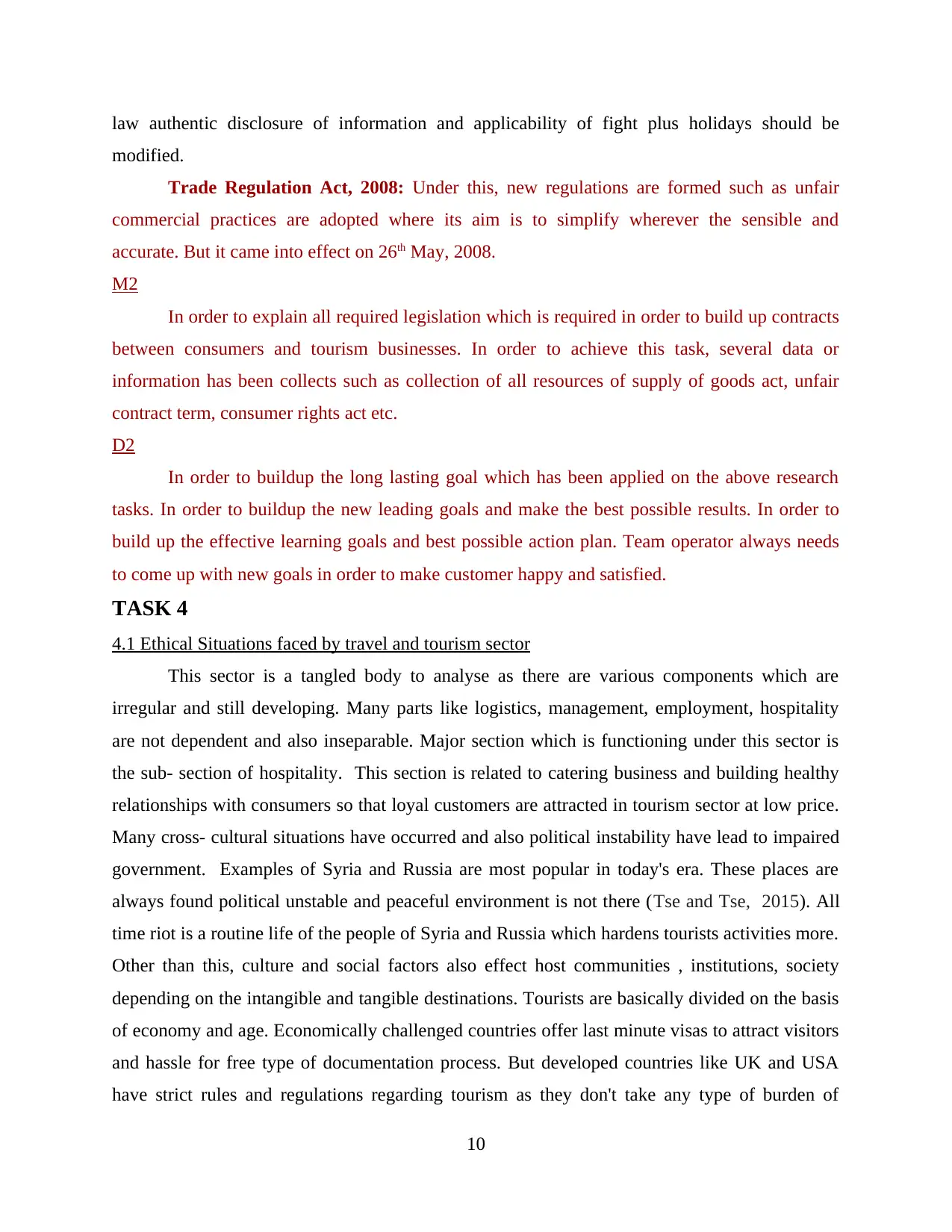
law authentic disclosure of information and applicability of fight plus holidays should be
modified.
Trade Regulation Act, 2008: Under this, new regulations are formed such as unfair
commercial practices are adopted where its aim is to simplify wherever the sensible and
accurate. But it came into effect on 26th May, 2008.
M2
In order to explain all required legislation which is required in order to build up contracts
between consumers and tourism businesses. In order to achieve this task, several data or
information has been collects such as collection of all resources of supply of goods act, unfair
contract term, consumer rights act etc.
D2
In order to buildup the long lasting goal which has been applied on the above research
tasks. In order to buildup the new leading goals and make the best possible results. In order to
build up the effective learning goals and best possible action plan. Team operator always needs
to come up with new goals in order to make customer happy and satisfied.
TASK 4
4.1 Ethical Situations faced by travel and tourism sector
This sector is a tangled body to analyse as there are various components which are
irregular and still developing. Many parts like logistics, management, employment, hospitality
are not dependent and also inseparable. Major section which is functioning under this sector is
the sub- section of hospitality. This section is related to catering business and building healthy
relationships with consumers so that loyal customers are attracted in tourism sector at low price.
Many cross- cultural situations have occurred and also political instability have lead to impaired
government. Examples of Syria and Russia are most popular in today's era. These places are
always found political unstable and peaceful environment is not there (Tse and Tse, 2015). All
time riot is a routine life of the people of Syria and Russia which hardens tourists activities more.
Other than this, culture and social factors also effect host communities , institutions, society
depending on the intangible and tangible destinations. Tourists are basically divided on the basis
of economy and age. Economically challenged countries offer last minute visas to attract visitors
and hassle for free type of documentation process. But developed countries like UK and USA
have strict rules and regulations regarding tourism as they don't take any type of burden of
10
modified.
Trade Regulation Act, 2008: Under this, new regulations are formed such as unfair
commercial practices are adopted where its aim is to simplify wherever the sensible and
accurate. But it came into effect on 26th May, 2008.
M2
In order to explain all required legislation which is required in order to build up contracts
between consumers and tourism businesses. In order to achieve this task, several data or
information has been collects such as collection of all resources of supply of goods act, unfair
contract term, consumer rights act etc.
D2
In order to buildup the long lasting goal which has been applied on the above research
tasks. In order to buildup the new leading goals and make the best possible results. In order to
build up the effective learning goals and best possible action plan. Team operator always needs
to come up with new goals in order to make customer happy and satisfied.
TASK 4
4.1 Ethical Situations faced by travel and tourism sector
This sector is a tangled body to analyse as there are various components which are
irregular and still developing. Many parts like logistics, management, employment, hospitality
are not dependent and also inseparable. Major section which is functioning under this sector is
the sub- section of hospitality. This section is related to catering business and building healthy
relationships with consumers so that loyal customers are attracted in tourism sector at low price.
Many cross- cultural situations have occurred and also political instability have lead to impaired
government. Examples of Syria and Russia are most popular in today's era. These places are
always found political unstable and peaceful environment is not there (Tse and Tse, 2015). All
time riot is a routine life of the people of Syria and Russia which hardens tourists activities more.
Other than this, culture and social factors also effect host communities , institutions, society
depending on the intangible and tangible destinations. Tourists are basically divided on the basis
of economy and age. Economically challenged countries offer last minute visas to attract visitors
and hassle for free type of documentation process. But developed countries like UK and USA
have strict rules and regulations regarding tourism as they don't take any type of burden of
10
Paraphrase This Document
Need a fresh take? Get an instant paraphrase of this document with our AI Paraphraser
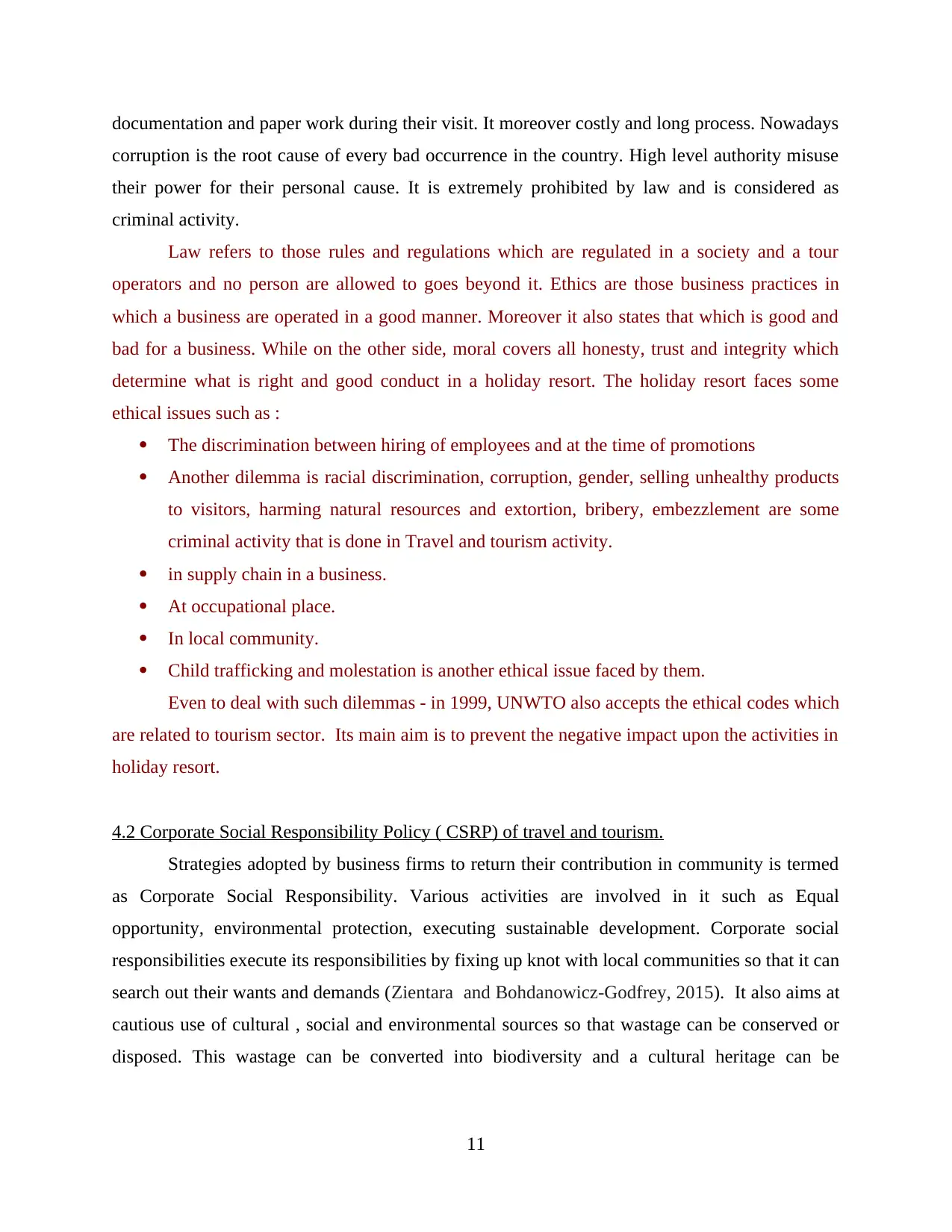
documentation and paper work during their visit. It moreover costly and long process. Nowadays
corruption is the root cause of every bad occurrence in the country. High level authority misuse
their power for their personal cause. It is extremely prohibited by law and is considered as
criminal activity.
Law refers to those rules and regulations which are regulated in a society and a tour
operators and no person are allowed to goes beyond it. Ethics are those business practices in
which a business are operated in a good manner. Moreover it also states that which is good and
bad for a business. While on the other side, moral covers all honesty, trust and integrity which
determine what is right and good conduct in a holiday resort. The holiday resort faces some
ethical issues such as :
The discrimination between hiring of employees and at the time of promotions
Another dilemma is racial discrimination, corruption, gender, selling unhealthy products
to visitors, harming natural resources and extortion, bribery, embezzlement are some
criminal activity that is done in Travel and tourism activity.
in supply chain in a business.
At occupational place.
In local community.
Child trafficking and molestation is another ethical issue faced by them.
Even to deal with such dilemmas - in 1999, UNWTO also accepts the ethical codes which
are related to tourism sector. Its main aim is to prevent the negative impact upon the activities in
holiday resort.
4.2 Corporate Social Responsibility Policy ( CSRP) of travel and tourism.
Strategies adopted by business firms to return their contribution in community is termed
as Corporate Social Responsibility. Various activities are involved in it such as Equal
opportunity, environmental protection, executing sustainable development. Corporate social
responsibilities execute its responsibilities by fixing up knot with local communities so that it can
search out their wants and demands (Zientara and Bohdanowicz-Godfrey, 2015). It also aims at
cautious use of cultural , social and environmental sources so that wastage can be conserved or
disposed. This wastage can be converted into biodiversity and a cultural heritage can be
11
corruption is the root cause of every bad occurrence in the country. High level authority misuse
their power for their personal cause. It is extremely prohibited by law and is considered as
criminal activity.
Law refers to those rules and regulations which are regulated in a society and a tour
operators and no person are allowed to goes beyond it. Ethics are those business practices in
which a business are operated in a good manner. Moreover it also states that which is good and
bad for a business. While on the other side, moral covers all honesty, trust and integrity which
determine what is right and good conduct in a holiday resort. The holiday resort faces some
ethical issues such as :
The discrimination between hiring of employees and at the time of promotions
Another dilemma is racial discrimination, corruption, gender, selling unhealthy products
to visitors, harming natural resources and extortion, bribery, embezzlement are some
criminal activity that is done in Travel and tourism activity.
in supply chain in a business.
At occupational place.
In local community.
Child trafficking and molestation is another ethical issue faced by them.
Even to deal with such dilemmas - in 1999, UNWTO also accepts the ethical codes which
are related to tourism sector. Its main aim is to prevent the negative impact upon the activities in
holiday resort.
4.2 Corporate Social Responsibility Policy ( CSRP) of travel and tourism.
Strategies adopted by business firms to return their contribution in community is termed
as Corporate Social Responsibility. Various activities are involved in it such as Equal
opportunity, environmental protection, executing sustainable development. Corporate social
responsibilities execute its responsibilities by fixing up knot with local communities so that it can
search out their wants and demands (Zientara and Bohdanowicz-Godfrey, 2015). It also aims at
cautious use of cultural , social and environmental sources so that wastage can be conserved or
disposed. This wastage can be converted into biodiversity and a cultural heritage can be
11
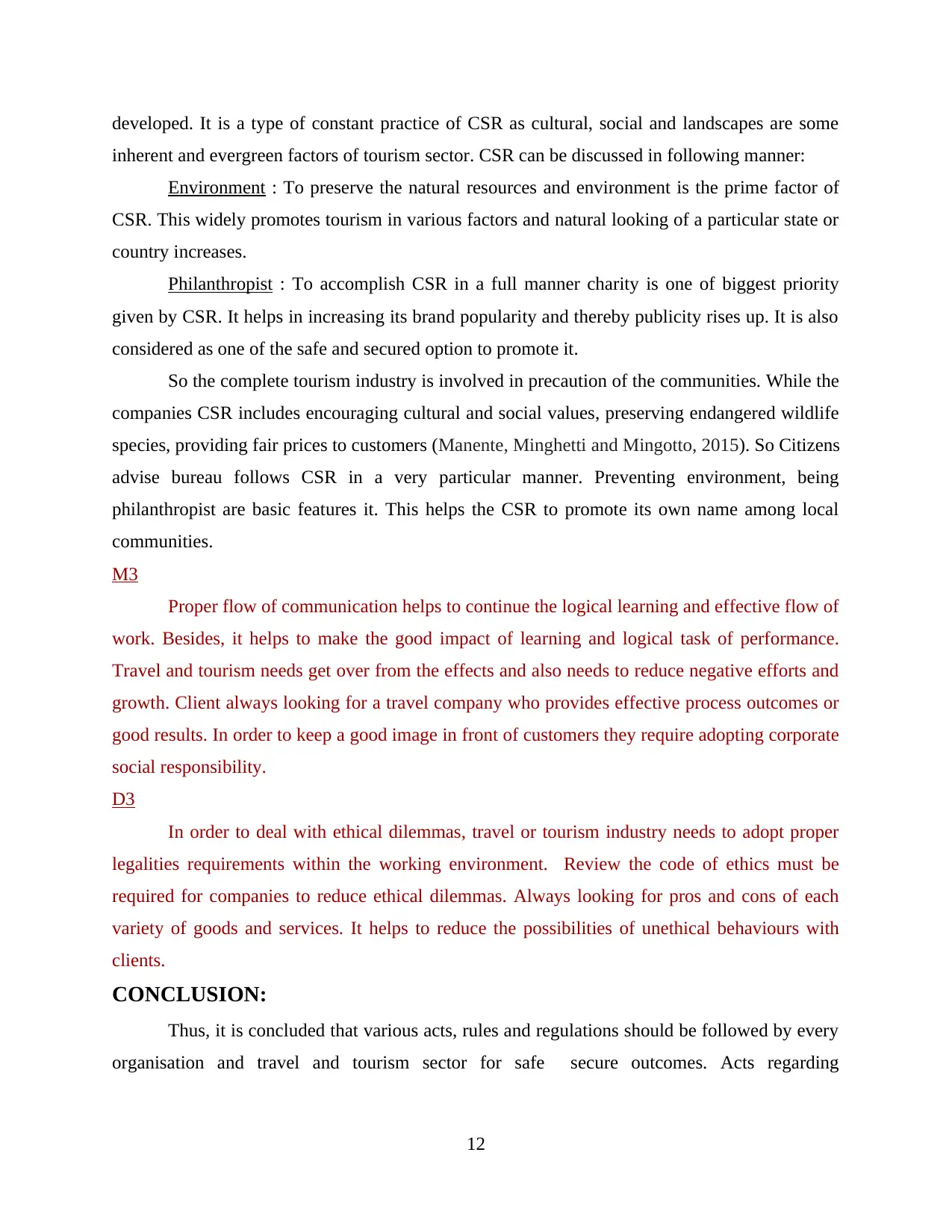
developed. It is a type of constant practice of CSR as cultural, social and landscapes are some
inherent and evergreen factors of tourism sector. CSR can be discussed in following manner:
Environment : To preserve the natural resources and environment is the prime factor of
CSR. This widely promotes tourism in various factors and natural looking of a particular state or
country increases.
Philanthropist : To accomplish CSR in a full manner charity is one of biggest priority
given by CSR. It helps in increasing its brand popularity and thereby publicity rises up. It is also
considered as one of the safe and secured option to promote it.
So the complete tourism industry is involved in precaution of the communities. While the
companies CSR includes encouraging cultural and social values, preserving endangered wildlife
species, providing fair prices to customers (Manente, Minghetti and Mingotto, 2015). So Citizens
advise bureau follows CSR in a very particular manner. Preventing environment, being
philanthropist are basic features it. This helps the CSR to promote its own name among local
communities.
M3
Proper flow of communication helps to continue the logical learning and effective flow of
work. Besides, it helps to make the good impact of learning and logical task of performance.
Travel and tourism needs get over from the effects and also needs to reduce negative efforts and
growth. Client always looking for a travel company who provides effective process outcomes or
good results. In order to keep a good image in front of customers they require adopting corporate
social responsibility.
D3
In order to deal with ethical dilemmas, travel or tourism industry needs to adopt proper
legalities requirements within the working environment. Review the code of ethics must be
required for companies to reduce ethical dilemmas. Always looking for pros and cons of each
variety of goods and services. It helps to reduce the possibilities of unethical behaviours with
clients.
CONCLUSION:
Thus, it is concluded that various acts, rules and regulations should be followed by every
organisation and travel and tourism sector for safe secure outcomes. Acts regarding
12
inherent and evergreen factors of tourism sector. CSR can be discussed in following manner:
Environment : To preserve the natural resources and environment is the prime factor of
CSR. This widely promotes tourism in various factors and natural looking of a particular state or
country increases.
Philanthropist : To accomplish CSR in a full manner charity is one of biggest priority
given by CSR. It helps in increasing its brand popularity and thereby publicity rises up. It is also
considered as one of the safe and secured option to promote it.
So the complete tourism industry is involved in precaution of the communities. While the
companies CSR includes encouraging cultural and social values, preserving endangered wildlife
species, providing fair prices to customers (Manente, Minghetti and Mingotto, 2015). So Citizens
advise bureau follows CSR in a very particular manner. Preventing environment, being
philanthropist are basic features it. This helps the CSR to promote its own name among local
communities.
M3
Proper flow of communication helps to continue the logical learning and effective flow of
work. Besides, it helps to make the good impact of learning and logical task of performance.
Travel and tourism needs get over from the effects and also needs to reduce negative efforts and
growth. Client always looking for a travel company who provides effective process outcomes or
good results. In order to keep a good image in front of customers they require adopting corporate
social responsibility.
D3
In order to deal with ethical dilemmas, travel or tourism industry needs to adopt proper
legalities requirements within the working environment. Review the code of ethics must be
required for companies to reduce ethical dilemmas. Always looking for pros and cons of each
variety of goods and services. It helps to reduce the possibilities of unethical behaviours with
clients.
CONCLUSION:
Thus, it is concluded that various acts, rules and regulations should be followed by every
organisation and travel and tourism sector for safe secure outcomes. Acts regarding
12
⊘ This is a preview!⊘
Do you want full access?
Subscribe today to unlock all pages.

Trusted by 1+ million students worldwide
1 out of 16
Related Documents
Your All-in-One AI-Powered Toolkit for Academic Success.
+13062052269
info@desklib.com
Available 24*7 on WhatsApp / Email
![[object Object]](/_next/static/media/star-bottom.7253800d.svg)
Unlock your academic potential
Copyright © 2020–2026 A2Z Services. All Rights Reserved. Developed and managed by ZUCOL.




